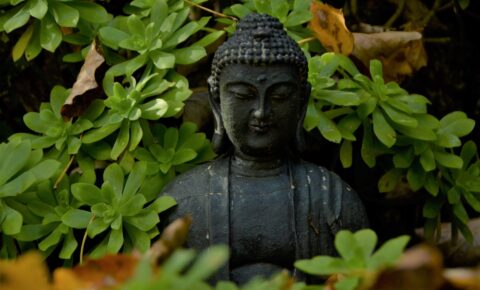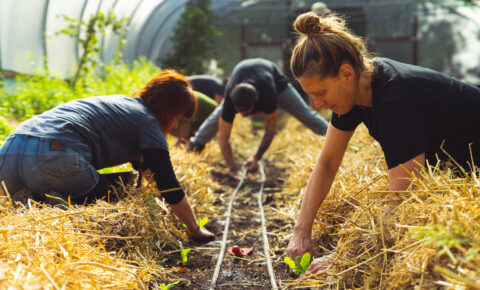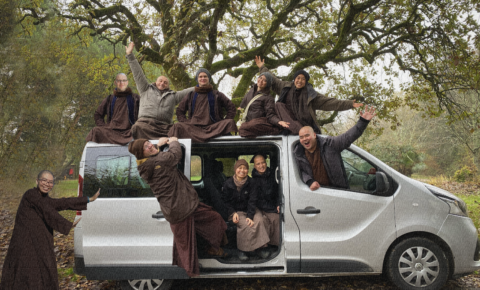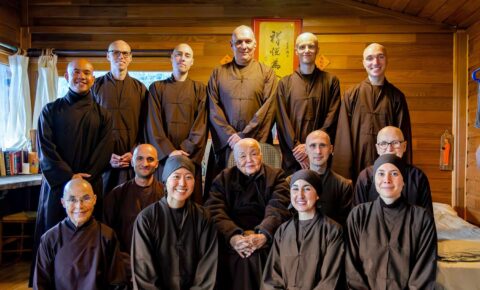Buddhism Beyond Religion
When I was last in China, I met with the vice-minister of religious affair, and we offered calligraphy saying “The Spiritual Dimension.” Although China is developing and strengthening their economy, education, arts, and politics, many people still suffer because they lack the dimension of spirituality in their lives and activities. Giving support to Buddhism, so that Buddhism can contribute to that spiritual dimension, will help people in China suffer less.
A few weeks ago, the School of Medicine of a university in Geneva asked me to teach about the human brain. They organized a week-long symposium on the brain, gathering neuroscientists and brain specialists to offer illumination on this topic. I am not a brain specialist, but they invited me because they want the spiritual dimension represented. I was also invited to the international conference of politicians and business leaders help at Davos, Switzerland. Neither am I a businessman, so why do they invite me? Because they see that business people and those in politics have suffering, worries, and fears, and they feel the need for the spiritual dimension. The Harvard medical school invited me to give a Day of Mindfulness for doctors and medical researchers. The spiritual dimension brings relief to people’s suffering, anxieties, and fears in all fields.
Monks, nuns, and lay practitioner have to bring Buddhism out of its religious context, to be able to share it with, and server the world. We have to bring Buddhism into prisons, schools, hospitals, and police headquarters so that people can live and work with more ease and less suffering. We need methods of mindfulness practice that can be used in all aspects of society, not limited by the form of religion.
Looking at the Plum Village Sangha’s activities, we see that the practice of mindfulness has been able to reach many sectors of society. We host retreats not only in Plum Village, but also in other countries of Europe, America, and Asia. We have had many retreats where parents, children, and teenagers practice together. We have hosted retreats just for young people in the United States, Australia, and Europe. We have had retreats for psychotherapists in America and Europe. We have had retreats for war veterans, environmentalist, doctors, nurses, psychotherapists, teachers, peace activists, and business people. We have brought the practice into prison. This year the school of Medicine at Harvard University wants me to come and receive an award. They say our retreats have helped heal many people, greatly relieving their suffering. They want to affirm that fact with and award. This is an indication that we have been able to surpass the limits of religion and enter the mainstream of society. We are not doctors, nor are we psychotherapists, but our retreats have brought rejuvenation, joy, and hope to thousand of people.
The Seed Has Traveled Far
Whenever we have a retreat, people from different religions practice together without any discrimination. Our teachings have been received easily, enthusiastically, and happily. Our method of practice seems to be applicable for many schools of Buddhism as well. Whether practitioners come from Japanese Zen meditation, Korean meditation, vipassana meditation, or Tibetan Buddhism, they all practice together and feel at ease in our retreats.
Business people who participated in a retreat held in Plum Village reported that, a few months after the retreat, they continue to have more insight into what they learned. The seed that were planted in the retreat continue to sprout bit by bit, offering deeper understanding. We have been able to present the teaching in such a way that young people and Westerners can understand them, accept them, and apply them. That is a big success of Plum Village, but it is not the work of one person alone or just the work of few years. It is the work of thirty –five years that includes twenty years of Plum Village and the work of the entire Sangha.
We have been able to present the Five Mindfulness Training in non-Buddhist terminology. The Five Mindfulness Training are very true and very deep expression of the practice of Buddhism. They are a concrete way of practicing mindfulness—not restrictive commandments. We have also presented the Fourteen Mindfulness as the essence of the practice of Buddhism. Many people who do not call themselves Buddhist like to recite the Fourteen Mindfulness Trainings. We have established more than eight hundred local Sanghas all over the world. In large cities like London, there are over ten Sanghas. Small towns also have their Sanghas. In Israel, there are Sanghas. In Australia and in Germany, there are many Sanghas. In Vietnam, there are numerous temples and Sanghas following the mindfulness practice of Plum Village. If you do not see these eight hundred manifestations all over the world, you have not seen Plum Village.
One day while sitting in London during a retreat, I was very moved to receive letters from practitioners in Edinburgh, Scotland, who wrote thoughtful letters about their practice and about their Sangha and shared their happiness. I have never been to Edinburgh, but the seed of Plum Village has traveled to Edinburgh and it has made me very happy. This is just an example of one of the many places I have never been, but where the seeds of our practice have flown. Here in France, there is a plant called pissenlit, the dandelion. When the dandelion plan ripens, it produces seeds, which the wind carries very far. In the same way, the seeds sown by Sangha of Plum Village have spread very far. They have traveled into prison, into Catholic cloister, into schools, families, hospitals, and communities around the world, and they will continue to go far in the future.
Harvesting Every Moment
Yesterday, Fei-fei, a lay practitioner living in Plum Village, asked me, “Thay, you work so hard, have you harvested the fruit that you want yet?” I responded, “My dear, what else do you want Thay to Harvest? Every moment of my daily life is a moment of happiness, is a harvest. As I sit with you now and teacher and disciple drink tea together, it is not to achieve anything. When we drink tea together, we are already happy. To give a Dharma talk is already happiness. To organize a retreat is happiness. To help practitioners be able to smile is happiness. What more do you want me to harvest?” our work should be happiness. Our practice is “dwelling happily in this moment.” Every Dharma talk I give has to reflect the Dharma Seal of Plum Village: “I have arrived. I am home.”
Courtesy of Pallax Press – “I have arrived, I am home; celebrating twenty years of plum village life“






Join the conversation